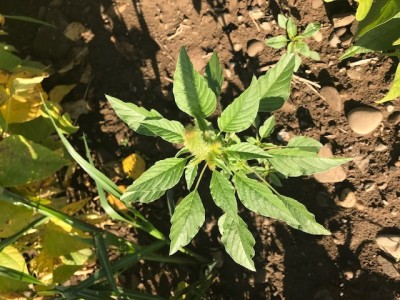Palmer Amaranth Confirmed in Southwest New York
Joshua Putman, Field Crops and Forage Specialist
Southwest New York Dairy, Livestock and Field Crops Program

Palmer amaranth (Amaranthus palmeri) is a serious problem for many growers throughout the United States because of its competitiveness and effect on agricultural production. Palmer amaranth is commonly confused with other pigweeds and is often difficult to identify in the early stages of growth. Much of the Palmer amaranth in the United States is resistant to several classes of herbicides such as glyphosate, and it's common for many of these to be resistant to ALS-inhibiting herbicides such as Pursuit and Classic.
Earlier this fall, it was noticed in two dry bean and several soybean production fields in Steuben County. This is the second population of Palmer amaranth to be found in New York, but is the first population to be found in a crop production setting. The fields are located along a high traffic roadway where it's possible that the specimens came in on a tractor trailer or piece of machinery. It is important to know the biology of Palmer amaranth to avoid its potential to spread to surrounding counties.
Palmer amaranth is aggressive as it competes for nutrients, sunlight, and water. Palmer amaranth has dioecious reproduction, so individual plants are either male or female, which forces outcrossing and genetic diversity. Under ideal conditions, Palmer amaranth can grow 2-3 inches per day and within a few months of emergence, can reach heights of 6-8 feet. It is a highly prolific seed producer in that it can produce 100,000-600,000 seeds per female plant. The seed is also very small and can be transported via machinery, mud, or travel on the bottom of your shoe. As the plant matures, it forms a poinsettia appearance and is a key characteristic for identification. It has been found that the presence of this weed species can double or triple your cost of management on the farm. If you suspect you have this weed species, please contact your local specialist or CCE office for correct identification and management. You may also see the link below for more information.
Upcoming Events
Boots in the Barn: Cornell Dairy Research Updates
January 13, 2026
January 20, 2026
January 27, 2026
February 3, 2026
February 10, 2026
February 17, 2026
February 24, 2026
Join us for some or all!
Deerworm and Flukes in Small Ruminants Webinar
February 25, 2026 : Deerworm and Flukes in Small Ruminants Webinar
Dr. Mary Smith from Cornell's College of Veterinary Medicine and Dr. Rachel White from UMaine Cooperative Extension will be discussing the lifecycles, signs, prevention, and management of deerworm and liver flukes in small ruminants.
NYSDEC How to Get Certified Course
March 3, 2026 : NYSDEC How to Get Certified Course
Ellicottville, NY
NYSDEC training course in preparation to take the pesticide applicator exam.
Announcements
Cows, Crops & Critters Newsletter Sponsorship
TRYING TO REACH GROWERS AND AGRIBUSINESSES IN OUR SOUTHWEST REGION OF NEW YORK?Weekly Email Update: Shared with 625+ households who have signed up with our program.
Monthly Paper Mailer: To reach our stakeholders and farmers who lack internet access, we send out a monthly mailer where your company's logo and contact information would be featured with a mailing list of 330+ households.
If you sponsor our weekly and monthly publications you reach approximately 955 households.





